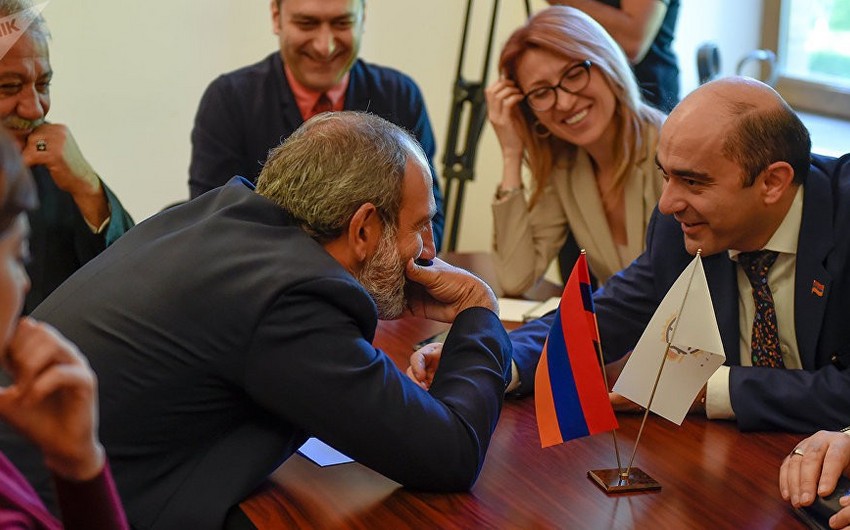Baku. 19 February. REPORT.AZ/ There has been no serious opposition in Armenia's political scene for almost a year. Interim president Serzh Sargsyan occasionally makes statements against the Republican Party of Nikol Pashinyan’s government, however, it appears to be more biased. Because their hatred against current political power continues. It is not ruled out that the Republicans' attitude towards Pashinyan and its political surrounding will remain the same.
Where there is no opposition, there is no alternative thought, objection and, most importantly, control of those who think differently about the government. This leads to the absence of democratic development of the society, which prompts establishment of dictatorships and authoritarian regimes.
Thus, according to the results of the presidential elections in Armenia on December 9, 2018, the political force led by Nikol Pashinyan nominated by My Step faction in the National Assembly won the political campaign garnering 70.43 percent of the votes (884,456 people).

In fact, the opposition was practically recognized in the discussion of the five-year action program of the Nikol Pashinyan’s government. Even though very few people supporting Tsarukyan voted for the document, Marukyans voted in favor of the program. This is also noticeable in Edmon Marukyan's speech: "The former government (presumably, Serzh Sargsyan) consulted on forming a government program. When Tigran Sargsyan was the prime minister, he called me from the Cabinet and said he wanted to discuss his program with me. But the current government did not discuss this issue with the factions. Marukyan accused the government of being "arrogant": "They want to say that there is no obstacle to them." The party leader said the deputy mandate was given to them by the people, not by Pashinyan.

"After these people come to power, they hold discussions with neuro-linguistic methods and mockery towards their opponents”. He commented on Nikol Pashinyan's statement, "poverty is in people’s minds", saying that in 1990, President Levon Ter-Petrosian, then Robert Kocharyan, then in 2000, were blamed for the hardships in the country, and later Serzh Sargsyan was guilty: Pashinyan says after the revolution: “poverty is in people's minds”. This is our political system. The Armenian society is accustomed to carrying all the power to the government. This position of society has confirmed itself.”
Meanwhile, there are different opinions voiced in the parliament. They condemned Pashinyan for failure to comply with his promises when he was in opposition. They emphasized the importance of leaving the Eurasian Economic Union and, therefore, criticized Serj Sargsyan’s government. However, it was emphasized that after coming to power, he rejected this idea. Nikol Pashinyan has called the program of his government as "economic revolution." Even though Gagik Tsarukyan did not speak directly, he said indirectly that, Pashinyan’s idea was nonsense: "Will people’s spirit and will are important for a political revolution, the economic revolution needs funds. The government’s program does not have such resources. Therefore, we cannot vote for the program. Tsarukyan’s speech reflects the truth. With what financial resources and investments will Pashinyan’s government implement the "economic revolution"? Or will he extort the wealthy people as Bolsheviks did? This method is outdated and has not been successful in the past. Although the primitive public-political-financial aspect is successful, at a later stage, a financial flow from the country is creating an atmosphere of distrust. Or does Pashinyan intend to receive this money through TV marathons in the United States and Europe, especially in France?

Finally, the parliamentary debate on the activities of the Pashinyan’s government has proven that Armenia needs serious capital and there is a gap in the program. The financial resources needed to implement the ideas outlined in the program have not been specified. Serious businessmen do not seem willing to invest in this country. Because the country has no political influence. It remains a risky in terms of financial investment. In this regard, Armenia under the rule of Pashinyan is no different from the country in the past. Russian companies have made the biggest investment in Armenia's economy. The coldness between Yerevan and Moscow makes it clear that this process will not continue as before. In other words, it is unlikely that Nikol's "economic revolution" will succeed. Before the program, the country's parliament did not discuss a serious issue. The discussion of this document can be called the presentation of the "opposition" to the Armenian political scene.



 https://static.report.az/photo/1b474977-deeb-4f55-ac3e-292bc16fd58e.jpg
https://static.report.az/photo/1b474977-deeb-4f55-ac3e-292bc16fd58e.jpg

